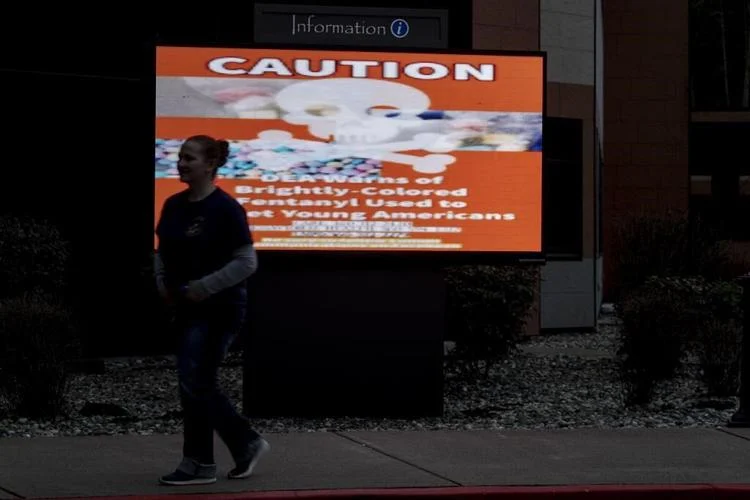
A display screen outside the Lumni Nation Tribal Headquarters, cautioning against brightly colored fentanyl, Feb 8, 2024, near Bellingham, Wash. (AP Photo/Lindsey Wasson)
Evelyn Jefferson traverses deep into a forest enveloping tents of Lummi Nation tribal members and calls out names. Alongside a nurse, she distributes naloxone, an opioid overdose reversal medication. Jefferson, a tribal member, understands the criticality of these kits: just five months ago, her son succumbed to an overdose from a synthetic opioid, a tragedy amidst four similar deaths in four days on the reservation.
A bill before the Washington Legislature seeks to allocate more state funding to tribes like Lummi, striving to shield the next generation from opioids. Recently, the state Senate unanimously passed a bill expected to provide nearly $8 million annually for the 29 federally recognized tribes in Washington, sourced partly from a settlement between the state and major opioid distributors, totaling around half a billion dollars.
The move responds to the alarming rates of opioid overdoses among Native Americans and Alaska Natives in Washington, which stand at five times the state average. Lummi Nation, like numerous tribes, grapples with additional hurdles in combating drug dealers due to jurisdictional complexities.
However, despite the proposed funding, tribes like Lummi feel it's merely a start. The tribe, home to about 5,300 people, has witnessed almost one overdose death weekly this year alone.
Lummi Nation requires $12 million to fund a 16-bed secure medical detox facility and to construct a new counseling center, far surpassing the annual allocation under the legislation. The proposed measure would direct funds from an opioid settlement account, including proceeds from the state's $518 million settlement with major opioid distributors in 2022, toward tribes confronting addiction.
State Senator John Braun, a sponsor of the bill, envisions distributing the funds through a grant program. However, opioid overdose deaths among Native Americans and Alaska Natives in Washington surged dramatically in recent years, reaching at least 100 in 2022, a stark increase from 2019.
In response, Lummi Nation declared a state of emergency over fentanyl, implementing measures like drug-sniffing dogs and checkpoints. Additionally, the tribe opened a facility to aid members with withdrawal and medication for opioid use disorder while advocating for broader responses to the crisis beyond tribal borders.
For Evelyn Jefferson, her efforts, marked by the loss of her son, epitomize resilience amid adversity. As she engages with tribal members in Bellingham, her presence signifies hope and care, echoing the sentiment of her niece's shirt: "fight fentanyl like a mother." Amid the bleakness of addiction, Jefferson remains a beacon of compassion, tirelessly advocating for treatment and support.















